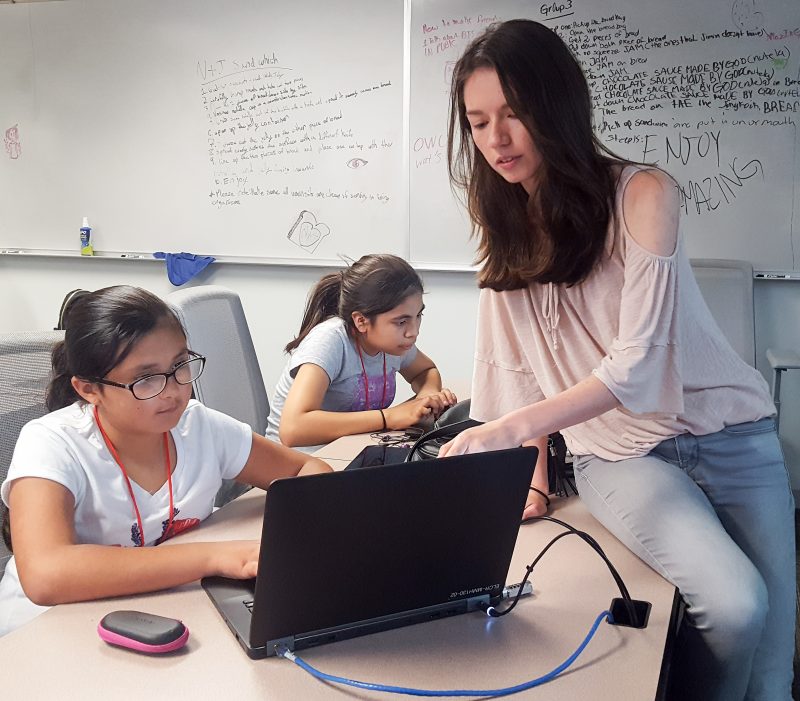The game was simple. First, one middle school girl wrote instructions on how to create the perfect peanut butter and jelly sandwich. Then, one of the Trinity University Women in Computing (TUWIC) members attempted to build a sandwich by following the list of steps, word for word. The sandwich-builders were in trouble when the instructions were not specific enough to follow; if a girl had written simply “peanut butter,” rather than “spread peanut butter on bread with a knife,” the process failed. This game mimicked the precision it takes to create algorithms.
Games like this abound at Trinity Encouraging Computing for Her (TECH) camp. This will be the fourth year since the camp was created. TECH allows middle school girls to come to Trinity every Saturday for three weeks and learn about computing from student volunteers.
On April 7, the girls competed in logic games and got to know each other and the camp leaders. This weekend, the girls will learn how to work with Scratch, a beginner programming language that allows users to create games and animations. Once the girls are familiar with Scratch, they will create a game related to a social issue they care about. They then present the game to their parents on the final weekend of the camp.
Sarah Fordin, junior biology and computer science double major, has been involved with the camps for three years and is the vice president of TUWIC this year.
“We’re targeting middle school girls because it’s a critical time when they’re trying to figure out: What am I interested in? What do I want to go into?,” Fordin said. “A lot of times people make the distinction of ‘Oh, computing is a guy’s job. You shouldn’t go in there. It’s too mathy. It’s too technical. You won’t do good.’ A lot of girls are discouraged around the middle school age.”
TECH camps are funded by the National Center for Women and Information Technology. This grant allows TUWIC to pay for instructor salaries, scholarships for the girls, and any additional equipment the camps might need. TUWIC members contact all the middle schools that they can in San Antonio, asking for any girls who might be interested in science. Many of the schools do not have any introduction computing programs, so many of the girls do not have experience when they arrive on campus.
“A lot of these other schools, they don’t have anything. Most of the girls, when we ask them, ‘What experience do you have in computers and tech?’ They’re like, ‘I can write on Microsoft Office,’ ” Fordin said.
Morgan King, sophomore computer science major and TUWIC president, spoke about the importance of these camps based on her own experience.
“I kind of started in middle school. I was part of a robotics club and that was a lot of fun. Then I took classes in high school, but not everyone has a chance to take classes like that or pick it up on their own,” King said.
King is excited to share her passion with the younger girls by teaching them how to create their programs. She shows the girls that computing can be a platform to share their thoughts on social issues they care about.
“We give them ideas, and then from there, they can just start learning and researching about the issue they care about. We leave it open-ended — just find something you’re into and make something that you think will help raise awareness,” King said.
The program ends with a sleepover on campus, complete with more food and more games. Sarah Zbidi, junior computer science major and TUWIC treasurer, says the camp leaders try to show the girls that computing can be a fun, life-long passion.
“We see that compared to boys, once they get to middle school, [girls] lose a lot of interest,” Zbidi said. “We want to promote [computer science] because we think that girls have the same amount of potential, but they often don’t get the attention they need. So we show them this can actually be really, really fun.”







